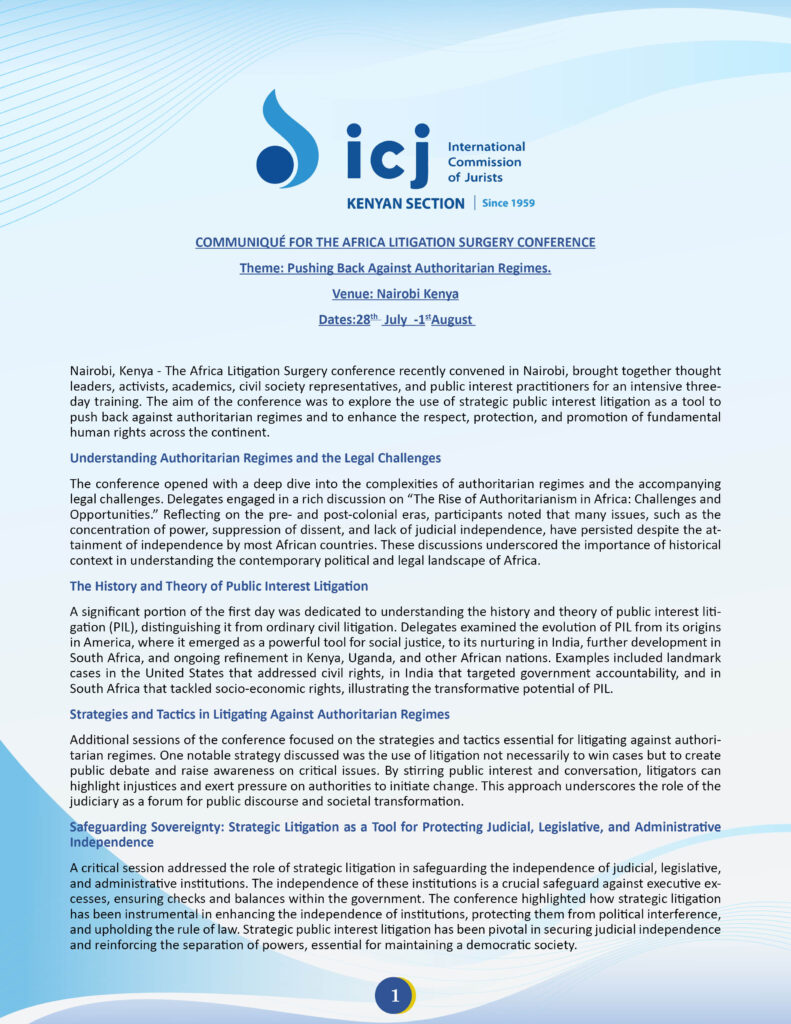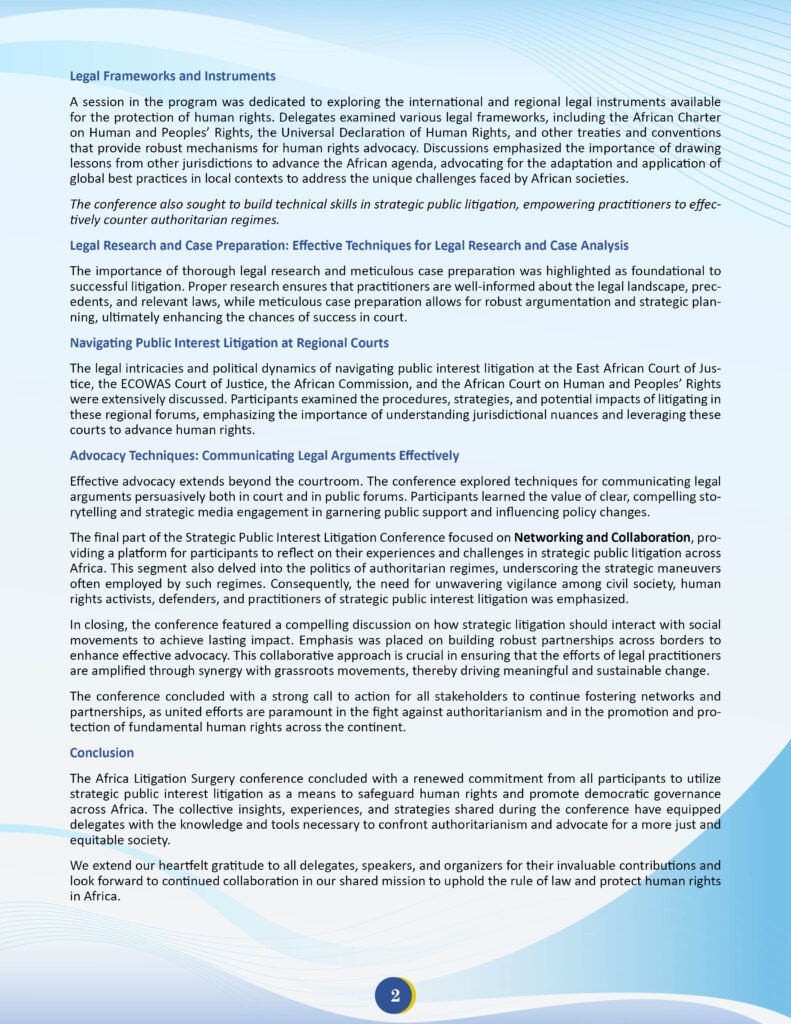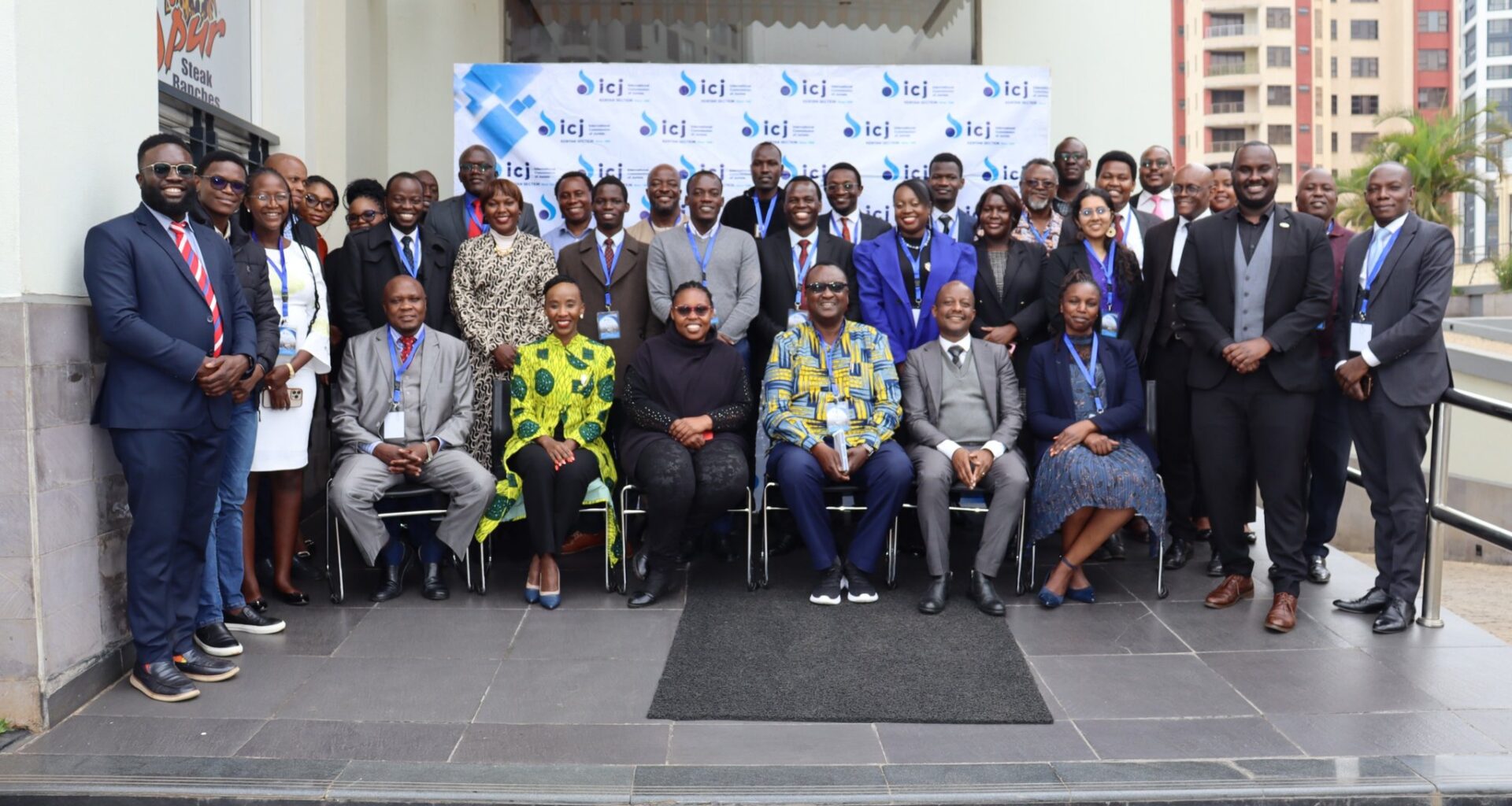NAIROBI, Kenya – The Africa Litigation Surgery conference recently convened in Nairobi, brought together thought leaders, activists, academics, civil society representatives, and public interest practitioners for an intensive three-day training. The aim of the conference was to explore the use of strategic public interest litigation as a tool to push back against authoritarian regimes and to enhance the respect, protection, and promotion of fundamental human rights across the continent.
Understanding Authoritarian Regimes and the Legal Challenges
The conference opened with a deep dive into the complexities of authoritarian regimes and the accompanying legal challenges. Delegates engaged in a rich discussion on “The Rise of Authoritarianism in Africa: Challenges and Opportunities.” Reflecting on the pre- and post-colonial eras, participants noted that many issues, such as the concentration of power, suppression of dissent, and lack of judicial independence, have persisted despite the attainment of independence by most African countries. These discussions underscored the importance of historical context in understanding the contemporary political and legal landscape of Africa.
The History and Theory of Public Interest Litigation
A significant portion of the first day was dedicated to understanding the history and theory of public interest litigation (PIL), distinguishing it from ordinary civil litigation. Delegates examined the evolution of PIL from its origins in America, where it emerged as a powerful tool for social justice, to its nurturing in India, further development in South Africa, and ongoing refinement in Kenya, Uganda, and other African nations. Examples included landmark cases in the United States that addressed civil rights, in India that targeted government accountability, and in South Africa that tackled socio-economic rights, illustrating the transformative potential of PIL.
Strategies and Tactics in Litigating Against Authoritarian Regimes
Additional sessions of the conference focused on the strategies and tactics essential for litigating against authoritarian regimes. One notable strategy discussed was the use of litigation not necessarily to win cases but to create public debate and raise awareness on critical issues. By stirring public interest and conversation, litigators can highlight injustices and exert pressure on authorities to initiate change. This approach underscores the role of the judiciary as a forum for public discourse and societal transformation.
Safeguarding Sovereignty: Strategic Litigation as a Tool for Protecting Judicial, Legislative, and Administrative Independence
A critical session addressed the role of strategic litigation in safeguarding the independence of judicial, legislative, and administrative institutions. The independence of these institutions is a crucial safeguard against executive excesses, ensuring checks and balances within the government. The conference highlighted how strategic litigation has been instrumental in enhancing the independence of institutions, protecting them from political interference, and upholding the rule of law. Strategic public interest litigation has been pivotal in securing judicial independence and reinforcing the separation of powers, essential for maintaining a democratic society.
Legal Frameworks and Instruments
A session in the program was dedicated to exploring the international and regional legal instruments available for the protection of human rights. Delegates examined various legal frameworks, including the African Charter on Human and Peoples’ Rights, the Universal Declaration of Human Rights, and other treaties and conventions that provide robust mechanisms for human rights advocacy. Discussions emphasized the importance of drawing lessons from other jurisdictions to advance the African agenda, advocating for the adaptation and application of global best practices in local contexts to address the unique challenges faced by African societies.
The conference also sought to build technical skills in strategic public litigation, empowering practitioners to effectively counter authoritarian regimes.
Legal Research and Case Preparation: Effective Techniques for Legal Research and Case Analysis
The importance of thorough legal research and meticulous case preparation was highlighted as foundational to successful litigation. Proper research ensures that practitioners are well-informed about the legal landscape, precedents, and relevant laws, while meticulous case preparation allows for robust argumentation and strategic planning, ultimately enhancing the chances of success in court.


Navigating Public Interest Litigation at Regional Courts
The legal intricacies and political dynamics of navigating public interest litigation at the East African Court of Justice, the ECOWAS Court of Justice, the African Commission, and the African Court on Human and Peoples’ Rights were extensively discussed. Participants examined the procedures, strategies, and potential impacts of litigating in these regional forums, emphasizing the importance of understanding jurisdictional nuances and leveraging these courts to advance human rights.
Advocacy Techniques: Communicating Legal Arguments Effectively
Effective advocacy extends beyond the courtroom. The conference explored techniques for communicating legal arguments persuasively both in court and in public forums. Participants learned the value of clear, compelling storytelling and strategic media engagement in garnering public support and influencing policy changes.
The final part of the Strategic Public Interest Litigation Conference focused on Networking and Collaboration, providing a platform for participants to reflect on their experiences and challenges in strategic public litigation across Africa. This segment also delved into the politics of authoritarian regimes, underscoring the strategic maneuvers often employed by such regimes. Consequently, the need for unwavering vigilance among civil society, human rights activists, defenders, and practitioners of strategic public interest litigation was emphasized.
In closing, the conference featured a compelling discussion on how strategic litigation should interact with social movements to achieve lasting impact. Emphasis was placed on building robust partnerships across borders to enhance effective advocacy. This collaborative approach is crucial in ensuring that the efforts of legal practitioners are amplified through synergy with grassroots movements, thereby driving meaningful and sustainable change.
The conference concluded with a strong call to action for all stakeholders to continue fostering networks and partnerships, as united efforts are paramount in the fight against authoritarianism and in the promotion and protection of fundamental human rights across the continent.
Conclusion
The Africa Litigation Surgery conference concluded with a renewed commitment from all participants to utilize strategic public interest litigation as a means to safeguard human rights and promote democratic governance across Africa. The collective insights, experiences, and strategies shared during the conference have equipped delegates with the knowledge and tools necessary to confront authoritarianism and advocate for a more just and equitable society.
We extend our heartfelt gratitude to all delegates, speakers, and organizers for their invaluable contributions and look forward to continued collaboration in our shared mission to uphold the rule of law and protect human rights in Africa.







